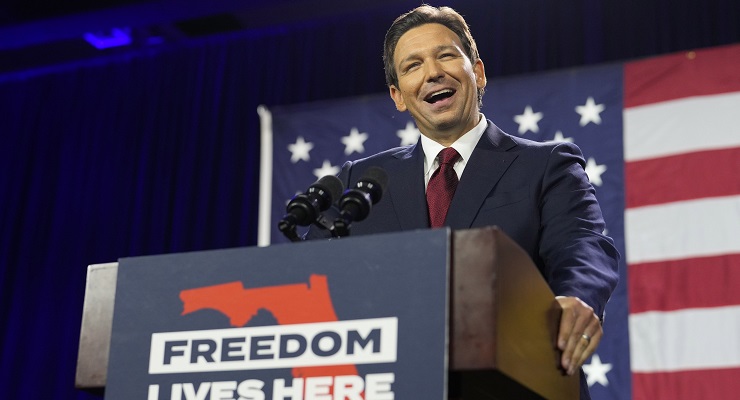
How long will it be before using the term “woke” as a sledge, a smear, and more generally a pejorative descriptor comes back to bite firmly on the arse people who see themselves as conservatives?
It is a question that has arisen in part because the term “woke” has been used by Ron DeSantis, governor of Florida, as a part of a rolling campaign against anything that emphasises developing an awareness of inequality in society.
A scan of DeSantis’ activities over the past 12 months indicates he is not a fan of anything that appears to mandate education or training or anything that boosts awareness of societal disadvantage. That awareness of institutionalised racial discrimination or disadvantage is itself the definition of being “woke” — a term that was first used last century but has appeared more frequently over the past decade with the rise of movements such as Black Lives Matter.
DeSantis’ derisive use of the term, especially in his rhetoric about Florida being the “place where woke goes to die”, came into greater prominence when he advocated for laws to prohibit the teaching of certain concepts and frameworks at universities, colleges and in workplaces.
That law (colloquially known as the “Stop WOKE Act”) aimed to limit how students and employees were taught about race, colour, national origin, or sex in class by professors or in training facilitated or provided by employers.
It was deemed unconstitutional in November last year by a judge who said the first amendment restricted the ability of the state to limit the viewpoints that university students could be taught.
Consider this for a moment. A court had to tell the Republican government of the state of Florida that the constitution prohibited restricting the freedom of speech of professors and students.
Where America goes, Australia follows
Australia is not immune to “woke” being used pejoratively in political discourse. It has already been used in the debate on the Voice to Parliament, with opponents characterising those who are advocating a vote for a constitutionally recognised Voice as “woke”.
Former prime minister Tony Abbott recently described companies that will back the introduction of a constitutional Voice as “woke public companies”. Abbott’s use of “woke” in his advocacy against the Voice was noted on Twitter by former Labor parliamentarian and minister Dr Craig Emerson. Emerson has pointed out the repeated use of the term “woke” by conservative commentators and politicians, and questioned why the term was being used more generally.
“Woke is to be conscious, thinking. Do those who use ‘woke’ as an insult prefer to be unconscious, unthinking? Using it as an insult seems to please their editors,” Emerson said.
The word is sometimes paired with “elites” for effect, such as when the conservative lobby group Advance Australia returned fire on individuals that attacked Warren Mundine, an Indigenous advocate against the Voice, for his opposition to the Voice.
“Here we have a bunch of wealthy, woke, left-voting elites in ivory towers making racial slurs about an Aboriginal man for speaking his mind,” Matthew Sheahan from Advance Australia said in August last year.
“No” case advocates need to be careful in employing the term in the lead-up to the Voice referendum because it is actually a neutral term in the Australian context. Most commentators acknowledge that there is a need to do more to help Indigenous communities across Australia improve their quality of life.
They are all “woke”, regardless of their perspective on the proposed Voice to Parliament.
The argument from the “no” side principally appears to be that the Voice is not an effective or appropriate vehicle to deal with the issues still facing Indigenous communities across Australia — along with purported concerns over detail that have been canvassed elsewhere by Crikey.
This perspective does not mean that the advocates against the Voice are any less “woke” than those supporting constitutional change, but it does mean that name-calling of this nature may well be counterproductive to their cause given there is nobody of significant standing stating they are unaware of the challenges faced by Aboriginal and Torres Strait Islander communities.
Can the genius who thought opening themselves up to ridicule and accusations of hypocrisy was a winning strategy in the Voice debate please raise their hand?
Can you take seriously any politician or public figure who uses ‘woke’ as an insult? Let us know your thoughts by writing to letters@crikey.com.au. Please include your full name to be considered for publication. We reserve the right to edit for length and clarity.








Crikey is committed to hosting lively discussions. Help us keep the conversation useful, interesting and welcoming. We aim to publish comments quickly in the interest of promoting robust conversation, but we’re a small team and we deploy filters to protect against legal risk. Occasionally your comment may be held up while we review, but we’re working as fast as we can to keep the conversation rolling.
The Crikey comment section is members-only content. Please subscribe to leave a comment.
The Crikey comment section is members-only content. Please login to leave a comment.